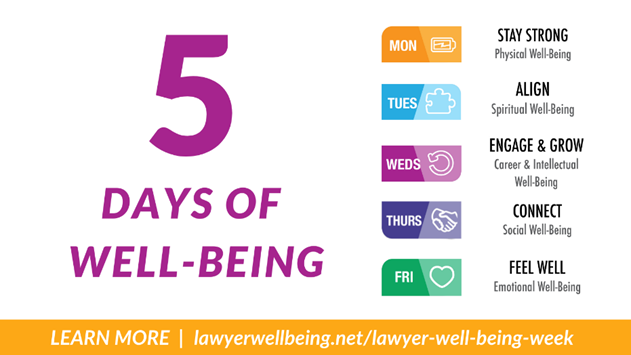Next week is Well-Being Week in Law (WWIL). This year’s theme:
The theme “embodies two key ideas: (1) a clean slate to start/restart our well-being action plans and (2) behavior change toward greater well-being.”
I’m focusing on the word “start.” The website is chock full of activities designed to spur a reboot. However, as I blogged last week, the goal shouldn’t be to choose an activity that gives us something to do during WWIL. Rather, the goal should be to find something that will serve as a starting point towards building healthy habits with which we engage long after WWIL concludes.
To that end, each day during WWIL will focus on a discreate component of well-being. In turn, each day’s programming will include activities designed “to support sustainable change.” Specifically, “Well-Being Mini Experiments to try out each day that may spark insight and inspiration to make long-term, positive change.”
Call me an optimist, but anything that “may spark insight and inspiration to make long-term positive change” seems like a good thing!
For each day’s theme and suggested “Mini-Experiments,” go here. There are SO MANY to choose from! From using the acronym “DREAM” to improve your sleep, to trying something new, to engaging in “Bursts of Benevolence,” to the benefits of adding even the tiniest bit of variety to your daily routine. There’s something for everyone.
Please consider trying even just one mini-experiment.
Who knows?
If you do, maybe by the time next year’s WWIL rolls around, you’ll have made well-being a habit.
Previous Wellness Wednesday Posts
- Wellness Wednesday: Try Positive Self-Talk
- Wellness Wednesday: Habitual Well-Being
- Wellness Wednesday: Practicing Gratitude Can Improve Your Well-Being
- Wellness Wednesday: You Can Do Hard Things
- Wellness Wednesday: A simple pledge
- Wellness Wednesday: I have cancer
- Wellness Wednesday: A Positive Approach
- Wellness Wednesday: We’ve only just begun to begin
- Wellness Wednesday: This holiday season, be well & let others be well
- Wellness Wednesday: Make Well-Being an Expectation in the Attorney-Client Relationship
- Wellness Wednesday: Pro Bono
- Wellness Wednesday: R.I.P. Ray Massucco
- Wellness Wednesday: Don’t Stresslax
- It’s healthy for legal employers to value employees as people
- Meet David Rocchio: The Move to Movies
- Wrapping up Well-Being Week: my self-report of significant bread-making violations
- With 40 Wellness tips, the ABA has at least one for everyone
- R.I.P. Charlie Kryst
- Aiming for Well-Being
- Wellness, Emotional Regulation, and the power of “What’s Important Now?”
- A lesson from my dad, Nandi, and The Foo Fighters: find & experience awe
- Ask the Question
- Wellness Wednesday: Set communication boundaries with clients & opposing counsel
- Yes, wellness includes the results of my first moot court competetion
- Wellness Wednesday: It’s okay to ask for help. Bar Assistance will listen and support you
- Wellness Wednesday: Set communication boundaries with clients and opposing counsel
- Wellness Wednesday: Compassion Fatigue
- Wellness Wednesday: A message from Justice Eaton
- Jessica Burke: “Well People Do”
- Wellness Wednesday: Schitt$ Creek and Paddles
- Wellness Wednesday: Be Kind to Lawyers
- Civility Matters. Especially Now.
- Coping with COVID-19 Related Stress & Anxiety
- Wellness Wednesday: Unplug
- Well-Being is an Aspect of Competence
- Wellness Wednesday: Survival Skills
- Wellness Wednesday: Make time for what (and who) matters
- Wellness Wednesday: Risk & Response
- Do summer your way
- Wellness Wednesday: Meet Alison, Shireen, Samantha, and Alison
- Reach Out, Check In
- Wellness Wednesday: Mentor Someone
- Wellness Wednesday: Joan Loring Wing
- Wellness Wednesday: Law Day & Pro Bono
- Get your sleep
- Take a Chance on Being Nice
- Attorney Wellness: We’ve Only Just Begun
- Be Kind to a Lawyer Today
- Be Nice to Someone Today
- Wellness v. Well-Being
- Wellness Wednesday: Meet Molly Gray
- Wellness Wednesday: Judge Garland & My Cousin Vinny
- Shakespeare, Pink Floyd and Wellness
- Wellness Wednesday: You are not an impostor
- Wellness Wednesday: “N O” is “O K”
- Wellness Wednesday: Stop it!
- Wellness Wednesday: Meet Jeff Messina
- Lawyers Helping Lawyers Part 2
- Lawyers Helping Lawyers: Keep it on the front burner
- Lawyer Well-Being: a call to action
- Anxiety, Stress & Work-Life Balance for Lawyers
- Make time for what matters
- Lawyer Wellness: resolve to find 6 minutes for yourself
- 108 is way too many
- Workplace Happiness
- Make Wellness a Habit
- A pledge by legal employers to focus on lawyer well-being
- Legal Ethics & the Water Cooler
- Wellness Wednesday: Island Vines
- Wellness Wednesday: on ponds, puffery and paltering
- Wellness Wednesday: Neil Diamond, the Lock Screen, and National Mental Health Day for Law Students







